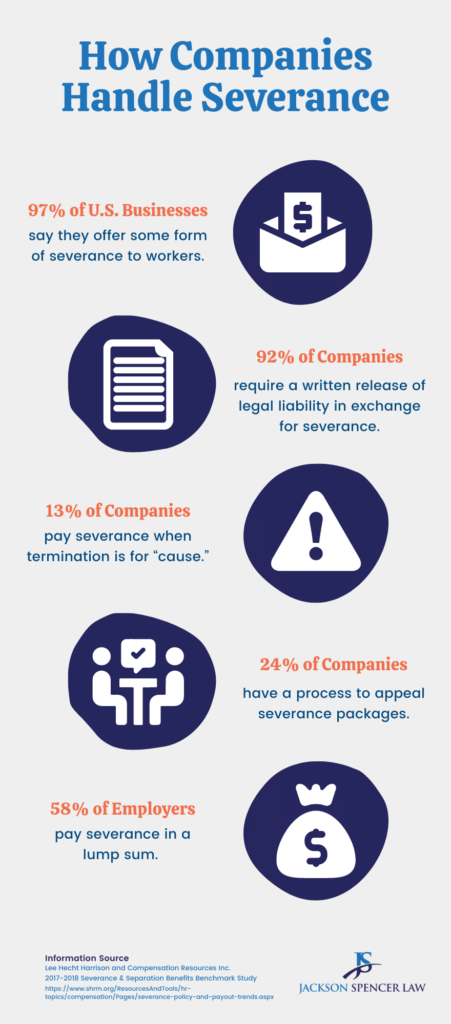If you are terminated and your employer hands you a severance agreement, you’ll want to know your rights before you sign anything. More often than not, severance agreements are drafted by an employer’s lawyer with provisions to protect the employer and not you, the employee.
In fact, many of these agreements ask you to give up many of your rights as an employee, such as your right to file a lawsuit or a claim with any employment oversight agencies. While you should still seek the advice of a lawyer before signing a severance agreement, here are the top 4 provisions to look out for:
- Non-competition and non-solicitation clauses;
- The method of severance payments (especially failure to pay in a lump-sum);
- What your employer can say about your ability to be re-hired; and
- Clauses that limit your ability to file for unemployment.
In this post, we’ll take a closer look at each of these severance agreement “red flags” and ways you might mitigate associated risks.
If you have been experiencing issues at work, such as discrimination, wrongful suspension, or wrongful termination, or are seeking guidance about employment or severance agreements, get a free comprehensive assessment with our legal team.
 1. Non-Competition or Non-Solicitation Clause
1. Non-Competition or Non-Solicitation Clause
A non-competition clause limits who, where, and when you can work after your termination. For instance, an employer may prohibit you from working for any of their competitors after you leave their company (e.g. “employee will not work for other marketing agencies.”). It is important to know that “blanket” non-compete clauses, such as the example I just gave, are typically not enforceable.
Non-competition clauses are supposed to be narrowly tailored, so as not to run afoul of state and federal laws. Non-compete clauses may stipulate that you do not work for any competitors within a specific geographic region (e.g. “employee will not work for other marketing agencies within the state of Texas.”). They might also stipulate a timeframe that you cannot work for a competitor (e.g. “employee will not work for other marketing agencies for a period of six months after termination.”). Often employers include provisions that enable them to sue a former employee that fails to comply with non-competition clauses, stop severance payments, recover any payments made as part of the agreement, and attorneys’ fees. They may even be able to force their former employee to discontinue their relationship with the competitor.
Non-solicitation clauses prohibit employees from “soliciting” a company’s clients or employees after leaving the company. If you sign an agreement that contains a non-solicitation clause, you cannot later encourage your co-workers to work for your new company (whether you are self-employed or work for someone else). You also cannot take your former employer’s clients with you to your new employer. This can be especially difficult for salespeople who may have established a strong working relationship with their customers. Legally speaking, employees and customers can always leave a particular company voluntarily, but a litigious former employer might still try to argue that you violated their non-solicitation clause.
Both non-compete and non-solicitation clauses should be a red flag when signing a severance agreement. These provisions limit your future employment prospects and can influence how successful you are in your next role. Unless your employer is offering a substantial severance package, these clauses may not be worth the risk.
2. Failure to Pay Severance as a Lump Sum
Some companies will try to make severance payments in installments, but it is usually best to request a lump sum. This way, you reduce the risk that the employer will stop installment payments because you have found a new job (or for any other reason they might muster). Also, receiving a one-time payment should not interfere with your ability to file for unemployment benefits later on. Installment payments, on the other hand, could make you ineligible for unemployment insurance.
3. Limitations on What Your Employer Can Say About Your Ability to be Re-Hired
Employers may include non-disparagement clauses in severance agreements, but you want to make sure this isn’t a one-way street. Non-disparagement clauses essentially limit what you can say about your employer and co-workers. The goal is to keep you from saying anything negative about the company to others. But you want to make sure the company is not able to speak negatively about you as well. This should definitely include comments about your performance or ability to be re-hired in the future.
4. Provisions that Limit Your Ability to File for Unemployment
In most states, you cannot receive unemployment benefits if you quit your job or were fired for cause. Review your severance agreement for any language that indicates you are resigning or being fired for performance issues. You do not want to risk losing unemployment benefits that you might need while looking for another job.
We Can Help You Secure a Fair Severance Agreement
When confronted with a severance agreement, the most important thing to remember is that you can negotiate. You do not have to accept your employer’s first offer, and you should consult with an attorney to ensure you’re protecting yourself. In fact, we wrote your action plan for getting the largest severance package possible, for you to review before you call.
At Jackson Spencer Law, our experienced employee rights attorneys offer free comprehensive assessments to advise you of your rights. There is no obligation or cost to find out if your severance agreement has been drafted in your employer’s favor.
Contact us for a free comprehensive assessment and we will help you determine whether your agreement serves your best interests and whether you should attempt to negotiate better terms.

